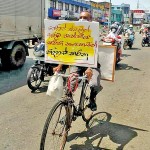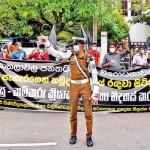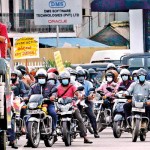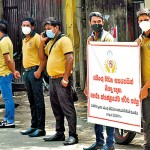News
Teachers’ campaigns take centre stage
View(s):Protest campaigns were held this week, on various issues across the country.
It was the protests by teachers and trade unions backing them that took centre stage. Most of them were related to last week’s events where trade union leaders who took part in demonstrations were allegedly forcibly taken to quarantine centres in distant locations, including Mullaitivu.
The protests by teacher unions last week were against the proposed Kotelawala National Defence University (KNDU) Bill, but this week the unions had a new demand – to call for the early release of those who have been put under a 14-day quarantine.
- President Gotabaya Rajapaksa drives past protesters on his way to Presidential Secretariat
- Teachers’ union protest in Kalutara
- Protest against KNDU Bill at Town Hall
- Protest by the JVP and trade unions. Pix by Akila Jayawardana, Eshan Fernando and Sarath Siriwardene
- Dengue field assistants protest
More than 30 unions have been actively campaigning for the release of those who were taken for quarantine while keeping to their main demand to withdraw the KNDU Bill which they claim will privatise or militarise the higher education system.
On Wednesday the unions took part in a vehicle parade in Colombo city, starting off close to the Nelum Pokuna theatre in Colombo 07. The protest ended in front of Town Hall. In contrast to last week, where the Police moved to arrest people claiming they were part of a gathering, posing the threat of spreading COVID-19, this time it was mostly traffic policemen who were on duty while other officers looked on.
Meanwhile, the online education system crashed with teachers withdrawing from them in support of the protests. Students only received messages, saying “Sorry, no classes.” Thus, the only mode by which teachers reached their students for the past one and a half years was seriously affected.
Ceylon Teachers Union (CTU) General Secretary Joseph Stalin, who was arrested during last week’s protest and moved to a Mullaitivu quarantine facility run by the Air force, continued his campaign along with other quarantined protesters by holding media conferences and chanting slogans while giving live coverage via Facebook. There was a free-flow of pictures and videos from the centre in Mullaitivu, thereby drawing more attention than the regular media conferences held by Mr Stalin in Colombo.
Farmers too continued their protest campaigns over the shortage of chemical fertiliser. In addition to the Janatha Vimukthi Peramuna (JVP) backed farmers’ unions, angry farmers who were seeing their farmlands being destroyed in front of their eyes, also organised protests on their own.The protests were widespread with paddy farmers, vegetable farmers, and tea cultivators being among them.
In Negombo and the south, fisherfolk took part in protests demanding concessions as the increase in fuel prices had affected them. One such group got into their fishing boats in Negombo with ‘pandam’ (improvised lamps or torches) lit up in protest.
The cost of living factor was also one of the subjects of protests. Backed by the JVP, a group of women activists took part in a protest in the Maharagama town on Wednesday. Their main grievance was the rising cost of living.
In Ratnapura, on Wednesday a group of pensioners were seen protesting. They were demanding that the Government should make full payments for pensioners without holding back the increased allowances.






